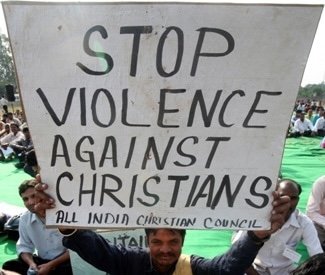United Methodist Church passes historic resolution on persecuted Indian Christians
UMC calls on US State Department to declare India a “Country of Particular Concern”
CHARLOTTE, N.C. — The General Conference of the United Methodist Church (UMC), which met in Charlotte, NC on April 30, 2024, overwhelmingly passed a resolution recognizing the persecution of Christians and other religious minorities in India by the Hindu nationalist movement and calling on the US government to take action.
The resolution focuses on the 2023 violence against tribal Christians in Manipur, India, where at least 120 people were killed by armed mobs operating with sanction of the state’s ruling Hindu nationalist Bharatiya Janata Party (BJP). The UMC is the first denomination in the world to pass such a resolution. The resolution appeals to the US State Department to “designate India as a ‘country of particular concern,’ or CPC, for engaging in systematic, ongoing, and egregious violations of religious freedom, as defined by the International Religious Freedom Act.”
The Rev. Scort Christy, President of the New Federation of Asian American United Methodists (NFAAUM), who introduced the petition, said, “Too often, we mourn the loss of lives after a terrible tragedy has occurred. This particular resolution is an urgent plea to proactively prevent atrocious acts of violence against Christians in India on account of their religious belief. We hope other denominations also follow UMC’s lead by passing similar resolutions.”
“Religious minorities such as Christians and Muslims live under constant fear and threat in India, the largest democracy in the world,” states the resolution. “Supported by the National and State governments, the Hindu Nationalist movement commits such religious violations in India.”
According to Rev. Neal Christie, Executive Director of the Federation of Indian-American Christian Organizations of North America (FIACONA), “As a church committed to ecumenism and interfaith relationships, through this resolution we’re calling on the State Department to look into the human rights situation in India and hold the government there accountable.”
“As a missionary in Southeast Asia, I saw how Christianity, in general, is not recognized by the government,” says Philippines-based UMC Bishop Israel Painit. “Religious persecution anywhere is concerning because it infringes on basic human rights and religious freedoms, but it’s particularly poignant when it happens in places like India, which prides itself on diversity and tolerance. Protecting religious minorities is essential for a just and inclusive society where all can live and worship freely.”
“What’s happening against Christians in India is that armed mobs of hundreds of people are invading church services, shutting them down, beating up the congregation and the clergy, and handing those people over to the police, who slap charges against the victims instead of the perpetrators,” explains journalist and author Pieter Friedrich, who spoke at a NFAAUM lunch the day before the resolution passed. “There are ongoing rapes, people are being dismembered, burned alive. These are the sorts of attacks we’re talking about.”
“As the most populated country in the world, India is rich in so many ways through technology, culture, cuisine and its history of many religions living side by side in peace,” says Rev. Audun Westad, a UMC pastor in Norway. “We appreciate all of this in Indian society, but we also know that religious minorities suffer there now. We stand with them and ask for better conditions, higher levels of acceptance, and that religion should not affect the possibilities you have as a human being.”
Comparing the situation to his home in Nigeria, UMC General Conference Delegate Amos Davidson says, “Because some states in northern Nigeria enforce Sharia law, Christian residents are systematically discriminated against and are effectively treated as second-class citizens. These communities are living under the constant threat of human rights abuses and injustice in courts of law. It is so reminiscent of what is happening in India, as Christians in both places face violent attacks during religious ceremonies and church worship while government officials either look the other way or actively participate.”
“Persecution of Christians and other religious minorities in India matters to me since I’m a devoted follower of Jesus Christ,” says Rev. Nelson Castorillo, an executive with UMC’s Asian-American Language Ministries. “Their pain is my pain and their suffering is my suffering. I have to do something about it and all of us Christians, for that matter, should do something. We need to stop these atrocious attacks against Christians and religious minorities. Religious bigotry should be a thing of the past and we should learn to co-exist and live with respect and love for each other.”
Friedrich explains that, in 2023, two states in India — Manipur and Chhattisgarh — saw attacks on Christians where tens of thousands were displaced, hundreds were murdered, and several hundred churches were burned down.
“When we learn what’s happening against Christians in India (and it’s also happening against other religious minorities in India), our responsibility as people of faith is to, first, become educated, but then, speak,” says Friedrich. “Don’t just cry about it silently at home. Pray, then put your prayers into some kind of action. That involves things like going to your church to get your congregation active and aware, trying to get your pastor taking the lead to speak on this, reaching out to US Congress, but especially getting the ecumenical Church — beyond the UMC or any denomination — coming together and talking about this to bring it to the forefront of our narratives.”
“The worldwide UMC should condemn these atrocities and denounce religious persecution in India and around the world,” concludes Rev. Castorillo. “This is what UMC is known for: championing the cause of Christianity through peace and justice.”
###
Contact:
Rev. Neal Christie
Federation of Indian-American Christian Organizations of North America (FIACONA)
202-285-4544
nealchristie@fiacona.org
Disclaimer: The views and opinions expressed in this article are those of the authors and do not necessarily reflect the official policy or position of the Religion News Association.

